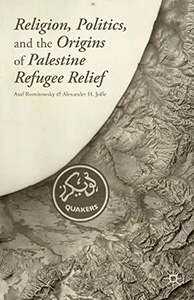|
Reviewed by Joseph S. Spoerl, Professor, Philosophy Dept., Saint Anselm College This book is a carefully researched study of the earliest efforts to provide relief to the Palestinian Arabs who became refugees during the first Arab-Israeli war, or Israel’s War of Independence, in 1948. While other groups, such as the Red Cross, provided emergency aid, this book focuses primarily on the role of the American Quakers (or “Friends”) operating through the American Friends Service Committee (AFSC). In addition to surveying all the available literature on the subject, the authors did extensive research in the Quaker archives in Philadelphia. For about 18 months, the AFSC provided relief to Palestinian Arab refugees in the Gaza Strip. The AFSC built schools and clinics and taught vocational skills. Unlike other organizations, the AFSC actually took the trouble to conduct an accurate census of refugees and thereby reduced the refugee rolls, fought corruption and fraud, and got costs under control. The Quakers had the quaint idea that it would be morally harmful to the refugees for them to remain on relief for too long. The goal, they thought, must be to help them start new lives and become self-supporting again, if not in Israel then elsewhere. When it became clear to them that the refugees themselves insisted on perpetual relief since repatriation to Israel was not feasible, the Quakers terminated their operations in Gaza, handing the work over to UNRWA, the United Nations Relief and Works Agency for Palestine Refugees in the Near East, which began to operate in 1950 and continues today, the population of “registered refugees” having burgeoned in the meantime from 735,000 in 1949 to over 5,250,000 today. (UNRWA, bowing to pressure from the Palestinians, unilaterally decided some years ago to define “Palestinian refugee” status as inheritable by patrilineal descent in perpetuity, thus guaranteeing the exponential growth of the very population that still demands a “right of return” to Israel proper.) This book shows that key features of the Israeli-Palestinian dispute were set very early. The Quakers noticed the refugees’ pronounced tendency to blame all their troubles on anyone but themselves. It never apparently occurred to any of them that the Palestinian leaders that many of them had presumably supported (e.g. Hajj Amin al-Husseini) bore much responsibility for the disaster of 1948. The Quakers documented the Egyptian government’s refusal to allow any movement of the refugees out of the Gaza Strip (controlled by Egypt until 1967), and they recognized that the Arab governments did not want the refugee problem solved, since they wished to use the refugees as a weapon to continue the struggle against Israel. The US government, which played by far the largest roll in funding and establishing UNRWA, encountered the same recalcitrance on the issue of resettlement. In the 1950s, the US tried to resettle the refugees in other countries, but the Arab states and the refugees themselves would accept nothing less than repatriation to Israel; barring that, they felt entitled to demand UN-funded welfare in perpetuity. The welfare continues to flow, with the US and even Israel fearing that any cutoff in aid will create instability in the areas populated by the refugees (the West Bank, Gaza, East Jerusalem, Jordan, Syria, and Lebanon). UNRWA answers to no one but the UN General Assembly, which is totally dominated by pro-Palestinian states. The vast majority of UNRWA employees are Palestinian “refugees” who have turned it into a rent-seeking organization that seeks above all else to keep itself in existence and maximize its income. UNRWA leaders publicly insist that Palestinian “refugees” have a “right of return” to Israel proper – a demand that has played a key role in sabotaging peace negotiations between Israel and the Palestinians, since no Israeli government could ever agree to it. It was the US and British founders of UNRWA who chose to make it autonomous instead of putting it under the General Secretary of the UN, thinking this would make it easier for the US and Britain to control it. Romirowsky and Joffe note wryly that UNRWA’s founders “failed to conceive that the relief organization would survive over sixty years and along the way, fall into the hands of its charges” (p. 117). UNRWA has become a major obstacle to the Israeli-Palestinian peace that successive US governments have been trying to broker now for decades. |


 Religion, Politics, and the Origin of Palestine Refugee Relief
Religion, Politics, and the Origin of Palestine Refugee Relief